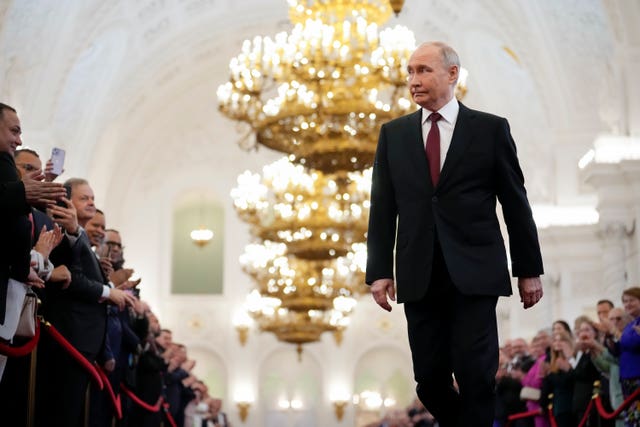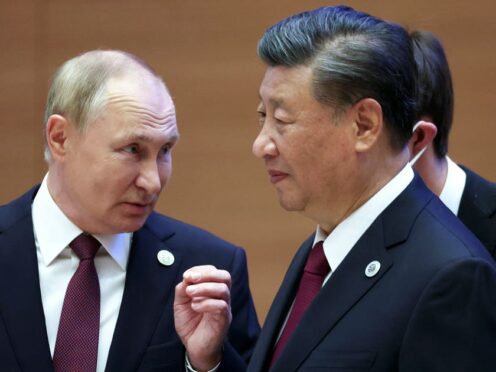China’s leader Xi Jinping welcomed Russia’s President Vladimir Putin on Thursday as he began a two-day state visit while Moscow presses forward with a new offensive in Ukraine.
They shook hands at a welcome ceremony after Mr Putin’s arrival in Beijing at dawn. Mr Putin, Mr Xi and other top officials are expected to hold meetings later that will emphasise their commitment to the “no limits” relationship they signed in 2022, just before Russia launched its full-scale invasion of Ukraine.
Since then, Russia has become increasingly economically dependent on China as Western sanctions cut its access to much of the international trading system.
On the eve of the visit, Mr Putin said in an interview with Chinese media that the Kremlin is prepared to negotiate over the conflict in Ukraine.
“We are open to a dialogue on Ukraine, but such negotiations must take into account the interests of all countries involved in the conflict, including ours,” Mr Putin was quoted as saying by the official Xinhua News Agency.

The Russian leader’s two-day trip comes as his country’s forces have pressed an offensive in north-eastern Ukraine’s Kharkiv region that began last week in the most significant border incursion since the full-scale invasion began, forcing almost 8,000 people to flee their homes.
Along with Moscow’s efforts to build on its gains in the nearby Donetsk region, the two-year-old war has entered a critical stage for Ukraine’s depleted military that is awaiting new supplies of anti-aircraft missiles and artillery shells from the United States.
“We have never refused to negotiate,” Mr Putin was quoted as saying by Xinhua.
“We are seeking a comprehensive, sustainable and just settlement of this conflict through peaceful means. We are open to a dialogue on Ukraine, but such negotiations must take into account the interests of all countries involved in the conflict, including ours.”
Ukrainian President Volodymyr Zelensky has said any negotiations must include a restoration of Ukraine’s territorial integrity, the withdrawal of Russian troops, the release of all prisoners, a tribunal for those responsible for the aggression, and security guarantees for Ukraine.
China claims to take a neutral position in the conflict, but has backed Moscow’s contentions that Russia was provoked into attacking Ukraine by the West, despite Mr Putin’s public avowals of his desire to restore Russia’s century-old borders as the reason for his assault.
Mr Putin has blamed the West for the failure of negotiations in the opening weeks of the war and praised China’s peace plan for Ukraine that would allow Moscow to cement its territorial gains.
“Beijing proposes practicable and constructive steps to achieve peace by refraining from pursuing vested interests and constant escalation of tensions, minimising the negative impact of the conflict on the global economy,” he had said.
Mr Putin said a Chinese proposal in 2023, which Ukraine and the West rejected, could “lay the groundwork for a political and diplomatic process that would take into account Russia’s security concerns and contribute to achieving a long-term and sustainable peace”.
The Kremlin said in a statement that during their talks this week, Mr Putin and Mr Xi will “have a detailed discussion on the entire range of issues related to the comprehensive partnership and strategic cooperation and determine the new directions for further development of cooperation between Russia and China and also have a detailed exchange of opinions on the most acute international and regional issues”.
Mr Putin began a fifth term in office this month.
